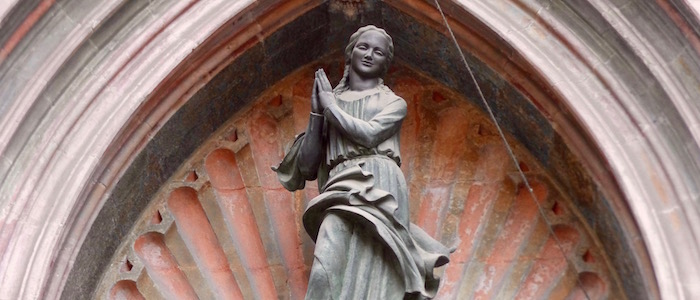

Point of interest (2). The Legend of Santa Eulalia.
Eulalia, a 13-year-old girl, stood out for her charitable nature. Poor people continuously knocked on the door of her house, as she always gave alms. This extreme kindness ended up bothering the girl’s parents, who punished her on several occasions. One day, Eulalia was carrying bread hidden in her skirt for a poor woman. Her father stopped Eulalia and asked her what she was carrying. The girl, terrified, answered that she was carrying flowers and fearfully opened her skirt in front of her father, and indeed they were flowers as the maiden had said.
Near Eulalia’s house there was a well with fresh and very good water, where the whole neighbourhood used to go. One day two girls went, and they found it dry. Afraid of being punished by their parents, who were very strict, they began to cry inconsolably. Eulalia heard them, and went to the well and put her cloak over it, and water gushed out of the well again, and the girls filled their pitchers effortlessly, so they were not punished by their parents. The groundwater was so subject to Eulalia’s will and reached such force that a new river was formed, which still feeds all the wells in the city and reaches the sea. The fishermen know it well and call it the river of Eulalia. There are seasons of the year when the current to the sea is so strong, that they have to be careful when sailing, since it could take them far out to sea. Our grandparents, who used the water from the wells, when all the wells were dried up, would ask Saint Eulalia to bring the water back.
Near Eulalia’s house, there was a large cypress forest. One day, Eulalia was walking in the woods, when an angel appeared to her and predicted that she would be a patron saint of Barcelona. The angel transformed the cypresses into palm trees. At that time, there were no palm trees on these lands, those were the first. Over the years, that palm forest disappeared and today there are very large trees, known as the Sarria desert.
In the 3rd century, when Diocletian, the emperor of Rome, decreed the relentless persecution of Christians, Eulalia was thirteen years old. She very bravely decided to go to the Roman temple of Augustus on Mount Tabor, in front of everyone, and rebuked and humiliated the emperor. Before leaving her house, she gave her parents a kiss, she gave another kiss to the floor tiles, and another to one of the cypress trees in the garden. When she arrived in Barcelona, she went to Augustus’ temple and insulted Diocletian. He told her that if she worshiped the false gods he would forgive her for everything she told him. Eulalia, instead of obeying him, took a handful of sand and threw it over the altar.
Diocletian ordered for her to be arrested and tortured. He locked her away in the palace prison. Since then, the sun has never entered this corner. Seeing that Eulalia did not want to apologise, she was sentenced to suffer thirteen martyrdoms, one for each year of her age. She was subjected to lashes with branches and harpoons which tore her skin and flesh. Seeing that she kept her faith, they put her feet in a burning brazier with fire. The emperor ordered her sores to be scrubbed with dry stone and sprinkled with burning oil and then molten lead. None of these martyrdoms shook her faith, so them ordered for her to be immersed in a pit of quicklime.
Another of her martyrdoms consisted of putting her naked into a barrel with shards of glass, stones and nails; once inside, the barrel was thrown down a slope thirteen times. In memory of her martyrdom, at the top of this street there is an image of Saint Eulalia with a barrel. Another martyrdom involved enclosing her naked in a pen full of fleas that bit her until her fine skin was sore. For this reason, citizens say that on the day of Saint Eulalia, February 12, the fleas are bigger than ever and bite more furiously. Another of the martyrdoms involved taking her naked in an ox cart that was driven throughout the city to shame the maiden. The sky took pity, and it began to snow, covering the girl’s skin with a white cloak. Saint Eulalia escaped from prison guided by an angel. Diocletian’s guards searched for her everywhere. When they found her, and to prevent her from running away from jail again, they decided to kill her.
She was nailed to an X-shaped cross. Tradition indicates the location in the Plaça de l’Ángel. When she closed her eyes, a dove-shaped soul flew out of her mouth and up to heaven. It is said that angels came down and took her body to glory. It is also said that when the snow came, the guards fled, and her parents were able to bury her body. When the guards came back, they saw what her parents had done and killed them because they did not want to tell them where their daughter’s body was. To remember the date she died, it never snows in Barcelona on the feast of Saint Eulalia.
In relatively modern times, her body was found in the church of Santa María. The whole city believed that it would be better to preserve it in the Cathedral, and a procession was organised for the transfer. Upon reaching the gates of the city wall, the coffin increased in weight in such a way that it was impossible to move it any further. Before the prayers of the attendees, an angel from heaven pointed to a canon, who, ashamed, confessed that he had taken a finger from Eulalia’s body as a relic. The canon returned the finger to the coffin, and it reduced in weight, and they were able to continue with the transfer to the Cathedral. In the place where the miracle took place, a column was erected with an angel and a finger in her hand; it is called the plaça de l’Angel.
On one occasion, a queen visited our city and wanted to see Eulalia’s body. The authorities objected, saying that the saint was naked, but the queen used her royal force, and there was no choice, they opened the tomb. When the queen saw the remains, she went blind, which was interpreted as a punishment from Eulalia. The repentant queen did penance asking to recover her sight, and the saint granted her sight again. Then the queen gave her a gold sash that she herself had made.
After the surrender of Barcelona to the King of Castile in 1714, there was an order to leave all weapons in churches. Saint Eulalia performed the miracle of hiding the weapons, and the Castile forces only found the rusty and unusable pieces of iron. The invading forces believed that they did not pay attention to the orders and searched all the houses, yet failed to find any weapons. After the search, Eulalia asked each one to return their weapons when they went to mass, so afterwards they were able to take weapons home and hide them.
Now that you know how religion has influenced the lives of Barcelona citizens since ancient Roman times, we are going to delve into the medieval world to learn more about the roots of this city.
Category: Barcelona walking Tags:
Contact and Booking
Mobile: +34649970408 pere.sauret10@gmail.com
Experiences
Hiking Walking Rock-climbing
Donate
Copyright © 2025 · All Rights Reserved · BarcelonaWalking Barcelona Hiking Barcelona Montserrat Costa Brava Pyrenees
Adventure Theme by Organic Themes · WordPress Hosting · RSS Feed · Log in
 BarcelonaWalking Barcelona Hiking Barcelona Montserrat Costa Brava Pyrenees
BarcelonaWalking Barcelona Hiking Barcelona Montserrat Costa Brava Pyrenees

